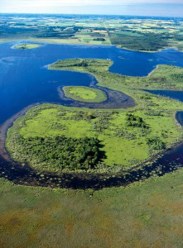- Take only pictures and leave only footprints.
- Do not pick wildflowers, berries, leaves, branches or bark.
- Never release any bait fish or aquarium pets, or dump bait water, into waterbodies. These are some of the most common means of spreading aquatic invasive species.
- Use the designated fire pits at your campsite for campfires. Fires anywhere other than the designated pit on your campsite are not permitted.
- Foraging is not permitted in Grand River Conservation Areas or other properties.
Keep our Conservation Areas beautiful
While visiting Grand River Conservation Areas and conservation lands, there are many things you can do to help keep them beautiful. Whether you're camping with family at your favourite conservation area, spending the day at the beach, or enjoying a quiet hike on one of our trails, together we can preserve and protect some of the Grand River watershed's most treasured properties.
- Don't break off tree branches for marshmallows or gather firewood from the surrounding forest.
- Please do not touch, break, tie tarps to, or drive over young and newly planted trees. These trees need our help to survive to maturity.
- Don't drive nails into campsite trees for hanging tarps or covers. Leave the trees as you found them. Don't leave cords or rope wrapped around trees when you depart.
- Firewood from outside the conservation area may carry invasive species that damage our forests. Please buy firewood on site rather than bringing it from elsewhere.
- While hiking, stay on marked trails. Trails are designed to take you to the most interesting places in the conservation area while keeping you safe from hazards and protecting the environment.
- Please respect any warning tape, fencing and signs that indicate to stay out of specific areas. They have been put there for your protection and the protection of our natural areas.
- Do not feed wildlife! It is not healthy for them and can do harm.
- When camping, be sure to pack food away in your car overnight to avoid attracting animals. Keeping a 'clean' campsite -- one that is free of dishes, garbage, food, and even toiletries -- means your campsite is not likely to attract wildlife.
- Don't touch, disturb or chase wildlife. This may cause stress and do harm.
- When photographing wildlife, stay at a distance and minimize disturbances.
- Consider fishing with barbless hooks to reduce injury to the fish you intend to release. Familiarize yourself with local fishing regulations.
- Wildlife is the responsibility of the Ministry of Northern Development, Mines, Natural Resources and Forestry (Information line: 1-800-667-1940).
Pay special attention to your best friend
- Please, take the 'lead'! Always keep your dog on a leash in all Grand River Conservation Areas and conservation lands. Fines can be issued for allowing your dog off-leash. This law protects your pet as well as the natural areas you're both visiting.
- Do not allow your dog to swim.
- Please note we do not have off-leash dog areas.
- Never leave your dog unattended, including in vehicles, campsites or picnic areas.
- Stoop and scoop. Trees are no place to hang dog waste bags! Dispose of dog waste bags in garbage bins or take them home for disposal.
- Never allow your dog to chase or disturb wildlife.
- Always stay on marked trails. This reduces the impact on our properties, protects birds and animals that may live or nest on the ground, and keeps everyone away from danger.
- Read more on dogs in our conservation areas.
- Do not burn garbage at your campsite. Place all recyclables in recycling bins before you leave and bring garbage to the garbage stations.
- Pay special attention to collecting and disposing of small pieces of garbage (such as plastic bread ties, drinking box straw wrappers and bottle caps) from your campsite or when at the beach/pool.
- Try to take food scraps home to your backyard composter.
- If you must use single-use propane canisters, take them with you when you leave and dispose of them at the hazardous waste area at your local landfill. They cannot be recycled or placed in garbage bins.
- Do not leave cigarette butts on the ground or in the sand.
- Please do not leave beach toys behind.
- When boating or fishing, bring waste back to shore and dispose of it properly.
- Dispose of used fishing line so it does not entrap or harm wildlife. Fishing line recycling depots are available at Grand River Conservation Areas in areas where angling is popular.
- Please do not bring balloons or water balloons to our conservation areas. Wildlife can mistake broken balloon pieces for food and ingest them, and/or become entangled in the strings. Do not release balloons into the air.
Did you know that all GRCA property is 'private land'? We own about 19,400 hectares (48,000 acres) of land -- about 2.8 per cent of the land in the Grand River watershed. Most of the property we own is taken up by Grand River Conservation Areas, conservation lands, rail trails and other natural areas.

As well, the GRCA receives no tax dollars to operate Grand River Conservation Areas. They operate only on the funds received through gate access fees, camping revenue, and pay-for-use programs, like canoe and tubing rentals. This sets us apart from federal or provincial parks that receive tax dollars to provide access and services to visitors.
]At Grand River Conservation Areas, warm, sunny days are the best way to generate revenue! Any excess revenue helps offset the years when the weather is poor, and/or is reinvested to improve visitor experiences and infrastructure.
Thank you for visiting and staying at Grand River Conservation Areas!
Contact Us
Grand River Conservation Authority
400 Clyde Road, PO Box 729
Cambridge, ON
N1R 5W6
Phone: 519-621-2761
Toll Free: 1-866-900-4722
grca@grandriver.ca
